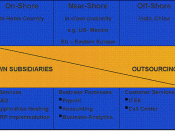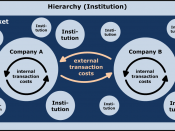Running head: IT OUTSOURCING� � PAGE \* MERGEFORMAT �1� �� IT OUTSOURCING� � PAGE \* MERGEFORMAT �4� ��
IT Outsourcing
Outsourcing is an agreement in which one company is appointed by another to do work that was once completed in-house or could be provided within the organization. This is an increasing trend that is becoming more common within the information technology (IT) department of the organization. IT outsourcing can range from one piece of the IT group to the entire IT management of a company being outsourced (Rouse, 2007).
Outsourcing Factors
Outsourcing has many pros and cons associated with it. Often, organizations feel that the advantages outweigh the disadvantages. However, it is all dependent on the company and what pieces they are outsourcing. When making a decision to outsource, there are many factors that should be addressed. Some questions that address whether or not to outsource and the factors involved can include:
Is this project a core business process?
Will specialized services be necessary and what is the duration?
Is confidential information involved?
Is there staff available or is new talent required?
Is close management of the day-to-day work required?
Asking these questions can work through many of the confusing pieces that can be brought about by outsourcing IT projects (Recca, 2014).
There are also factors that can lead to not outsourcing IT functions within an organization. These can include, but are not limited to lost product or service quality, hidden costs, and the potential threat to security and confidentiality (Bucki, 2014).
Risks and Benefits of Outsourcing
There are risks and benefits to outsourcing IT functions in an organization. Some of the risks that can be experienced with outsourcing include:
Loss of control of operations and deliverables that are outsourced
Loss of sensitive data or confidentiality
Delays in work output...


